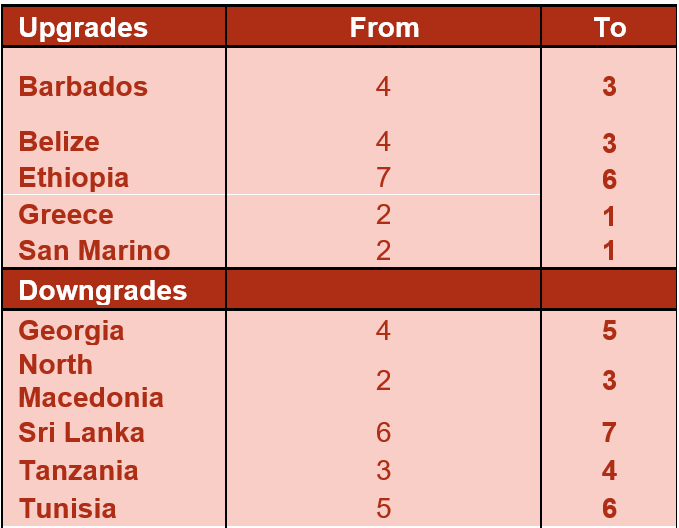Short-term political risk: Five countries upgraded and five countries downgraded

In the framework of its regular review of short-term (ST) political risk, Credendo has upgraded five countries and downgraded five countries.

Ethiopia: upgrade from category 7/7 to 6/7
The conflict between PM Abiy Ahmed’s federal government and the Tigray People’s Liberation Front (TPLF) escalated in November last year when the Tigray forces advanced far into the Afar and Amhara regions, threatening Addis Ababa, the capital. In December 2021, Credendo therefore decided to downgrade Ethiopia’s short-term political risk classification to category 7/7. A federal counter offensive, supported by mass civilian recruitment and foreign military equipment, succeeded in pushing back the TPLF to the Tigray region and neighbouring areas in the Afar and Amhara regions. A humanitarian truce was agreed between the federal government and the Tigray forces in March – which has been observed so far by both parties. Although the truce has enabled humanitarian aid to enter into the Tigray region, its amount has been far from sufficient. The reduction in the geographical scope of the conflict and the fact that both parties have observed the truce so far has led to a decrease in political violence risk, as highlighted by the upgrade of the political violence risk rating to category 6/7. Therefore, Ethiopia’s short-term political risk rating has been upgraded to 6/7.
Sri Lanka: downgrade from category 6/7 to 7/7
The poor liquidity situation has continued to deteriorate in the country. In April, foreign exchange reserves became so scarce – barely two weeks of imports – that the authorities suspended their external debt repayments, which led to a first-ever sovereign default in May – while the country is struggling to import essential goods (such as fuel, medicines and food), which is translating into acute shortages. Therefore, hard currency will be accessible first and foremost for most basic goods, which will sharply increase non-payment risks on other imports. While requesting emergency financial assistance from bilateral and multilateral creditors, the government is now negotiating a new IMF loan and a debt restructuring programme with all creditors, private and public. Talks will not be easy given high political instability (the President being largely contested) and debt relief negotiations will be hard, with diversified creditors and a reluctant China to accept losses on its loans. In this context and taking into account heavy commodity imports and poor prospects in tourism and global demand (EU and US), the economic and liquidity crises are likely to continue for many months. Amid this negative outlook, moving Sri Lanka to the highest risk category was justified.
Tunisia: downgrade from category 5/7 to 6/7
Tunisia is currently experiencing a period of heightened economic and financial turbulence, which is affecting its liquidity and restricting its financial market access. The current global economic outlook and geopolitical situation are adding to the country’s difficulties. Since the containment measures related to the Covid-19 pandemic, the tourism sector – a key sector for the Tunisian economy and a significant source of foreign currency – has been underperforming. The sector has yet to recover fully and a possible global slowdown is threatening the ongoing recovery. Moreover, the war in Ukraine is putting additional pressure on Tunisia’s liquidity, as the country is a net oil importer and reliant on cereals imports from Ukraine. Consequently, the current account deficit is expected to deepen this year, topping 10% of GDP. Moreover, amid tightening global financial conditions and weak public finances, Tunisia’s market access has deteriorated – notable rating agencies downgraded the country in recent months. On a positive note, negotiations are ongoing between the Tunisian authorities and the IMF. Support under an IMF programme could improve the country’s outlook. However, an IMF programme would be conditional on structural and credible reforms and the current tense socio-economic and political situation makes reform implementation challenging.